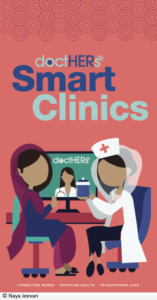Access to healthcare is a major challenge in low- and middle-income countries, with financial and physical barriers playing a key role. This includes Pakistan, which has a severe shortage of care providers, and a large number of people living in poverty who are unable to afford quality care [1]. The cyclical relationship between poor health and poverty at the individual level is well-recognised, with poor health also linked to low economic productivity at the national level [2, 3]. There is a critical need for initiatives to improve healthcare access in a sustainable and scalable manner in the country.
Naya Jeevan entered the social enterprise space in Pakistan in 2009 with the aim of providing low-income families access to quality, affordable healthcare. Naya Jeevan’s target population is the ‘working poor’, approximately 90 million people making less than $8 a day, who are linked to corporations and corporate value chains, but are mostly isolated from Pakistan’s health system. Associated with organizations such as ILO, USAID, Google Ventures, World Economic Forum, TED and Ashoka, Naya Jeevan embeds a health insurance plan inside an ecosystem of preventive health services.
In Naya Jeevan’s ‘manage care’ health model, the employer’s Customer Service Representatives (CSR) team, Patient Care Coordinators (PCCs) and remote general physicians (GPs) manage the end-to-end healthcare of workers (Naya Jeevan members). This includes providing members with round-the-clock guidance, and access to healthcare from the convenience of their own homes through mobile services. Additionally, Naya Jeevan regularly conducts awareness campaigns for members, on issues ranging from hepatitis and diabetes to sanitation and women’s health. As part of its health plans, Naya Jeevan also leverages mobile technology: in association with Telenor Pakistan, it has created a nationwide cashless network of healthcare venues where members can use their mobile wallets to pay for procedures, without the hassle of reimbursements. These health plans are co-financed by corporations employing Naya Jeevan members, as loyalty incentive programs, creating a sustainable framework with business and social benefits for all parties involved.
To date, Naya Jeevan has enrolled more than 100,000 people, winning numerous awards along the way, and is now a self-sustainable for-profit organization with a philanthropic arm. In 2017 and 2018, Naya Jeevan screened 2382 members for hepatitis, and 2424 for diabetes, identifying 322 and 350 confirmed cases respectively, who were then effectively followed up through its managed care model. By providing health insurance to distributors and micro-retailers in Unilever’s value chain, as well as their families, Naya Jeevan’s efforts have contributed to Unilever Pakistan reducing its employee attrition from 44% to 4% over 4 years (at a net savings of one billion PKR). Feedback from workers indicated an 80% increase in satisfaction largely attributed to the health care plans provided to them and their families, enabling them to treat diseases that would have otherwise been unaffordable. Naya Jeevan has now expanded its operations into schools, restaurants and small businesses.

In its newest venture, the SMART Clinic, Naya Jeevan is working alongside its sister company, doctHERs, to provide on-site telemedicine services along with its health insurance plans to textiles factory workers, so they can address their primary care needs without having to leave the premises. These workers, predominantly women, are the backbone of the textiles industry, and important contributors to their household finances. doctHERs is a vast network of over 200 remotely located female doctors who provide high-quality clinical consultations via nurse-assisted telemedicine. doctHERs’ unique service, matching the unmet healthcare needs of marginalized and underserved populations with the under-utilised capacity of qualified female physicians who have stopped practicing due to socio-cultural constraints, is the winner of the MIT ‘Solver’ award and Tommy Hilfiger Social Innovation Challenge. Through the SMART Clinic, in association with the UN Foundation, doctHERs is reaching a growing population in need of quality clinical services, and focuses both on primary care and preventive health.
Through its innovative model for healthcare financing and clinical service provision, and by providing value for all parties involved in this enterprise, Naya Jeevan helps to bridge an important gap in access to healthcare. It aims to continue to improve health and drive development by expanding its services, and providing sustainable healthcare solutions for marginalised communities across Pakistan.
References
1. Nishtar, S., et al., Pakistan’s health system: performance and prospects after the 18th Constitutional Amendment. Lancet, 2013. 381(9884): p. 2193-206.
2. Bloom, D.E. and D. Canning, Population Health and Economic Growth. 2008, The World Bank: Washington, D.C.
3. OECD, DAC Guidelines and Reference Series: Poverty and Health. 2003, OECD, WHO: Paris.

